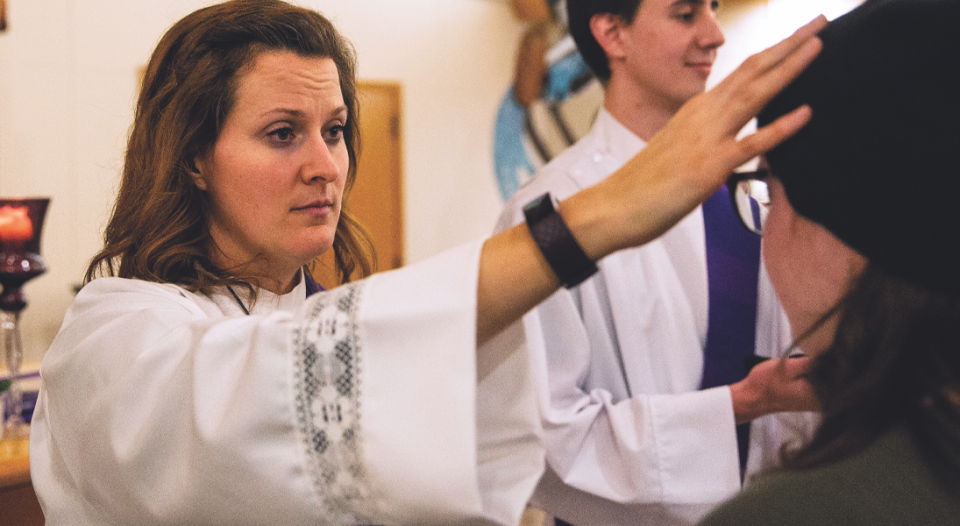Ash Wednesday is a poignant day for many rostered ministers. We trace the assurance of death on faces we love: old faces wrinkled with stories, newborn faces with eyes too big for tiny heads, furrowed faces sagging with worry, bright faces warm with joy, beloved faces of so many colors and contours and expressions—all of them ticketed for the grave. Maybe we baptized them. Maybe we will attend their funeral, or they ours. We look into deep, dear, lively eyes and put souls on notice: Remember that you are dust, and to dust you shall return.
When COVID-19 reinforced this annual reminder with terrifying clarity, many rostered ministers and faith communities got creative about Ash Wednesday. There were masks, gloves, swabs, “drive-through” ashes, home deliveries, virtual liturgies and more. How does one deliver such intimate truth from a social distance?
Even before the pandemic, I observed an uptick in both demand and creative supply on Ash Wednesday. New visitors came to worship; seasoned ministers went to storefronts and train stations with portable ashes for people too busy to die. Apparently there’s a market niche for free, unfiltered honesty.
Remember that you are dust, and to dust you shall return.
Death, Paul wrote, is the paycheck for sin, and it arrives for us all. The church has bundled sin and death as a package deal ever since, not always helpfully. What could simply be the natural or tragic end of a precious life becomes laden with blame, guilt, shame, regret and anxiety about our eternal fate. Our desperate bargaining for answers to mitigate our grief and helplessness can muddle a holy mystery. Yet dismissing Paul’s insight into the link between death and sin is dishonest. Ash Wednesday insists that we face both.
Each is a breakage. Death breaks the connection between breath and body that constitutes life. Sin breaks the connection between us and God that constitutes eternal life, our dynamic union with God and, by extension, all God’s beloved creation. This sacred bond is not just a future hope but a present possibility. Death doesn’t begin eternal life—it transforms and deepens it. That’s the gospel of baptism, that other time when our foreheads are marked (in oil rather than ash) with the sign of Christ’s cross. “Beloved, we are God’s children now; what we will be has not yet been revealed” (1 John 3:2).
The deep promise of Ash Wednesday
What is revealed now, in the brilliant afterglow of Epiphany, is the disconnect and distance between who God is, unveiled in Jesus Christ, and how we currently are. The New Testament borrows an image from archery: we miss the mark. In English the term is translated as “sin.”
Like the fourth step in Alcoholics Anonymous, Ash Wednesday invites us to make “a searching and fearless moral inventory of ourselves.” Lent will offer us a full 40 days for this daunting work. That’s a lot of unfiltered honesty. We have many wayward arrows to gather.
Part of the genius of this is that picking up our fallen arrows forces us to bend down. Finding them in the dust, we find ourselves. Remember that you are dust, and to dust you shall return.
This is more than a warning; it’s a promise. Don’t discount dust! Look beneath the couch: dust is everywhere. Dust is the DNA of the stars and of the couple next door. Dust connects us, and reconnects us, to creation, especially the earth and its most vulnerable inhabitants, who suffer from our egocentric myopia, cruelty and neglect.
Dust also carries the promise and power of life.
Dust also carries the promise and power of life. When we become worm food, worms are fed and life advances. That capacity to nourish life is already present in us now, before we die, and will be transformed and deepened on the other side. “If it dies it bears much fruit” (John 12:24).
Remember that it was dust that God first scooped up to begin sculpting a new, unprecedented friend. Well before the introduction of death and sin, God breathed the breath of life into dusty nostrils to kindle human life. Our journey begins in God’s hands.
Remember that you are dust, and to dust you shall return. The deep promise of Ash Wednesday is that, by way of the cross, we are all heading home. We will again be fully and truly ourselves. We will again be held in God’s hands. We will again be poised to awaken to wonder and beauty, far exceeding what a handful of dust could possibly imagine. We will be born again.
For now, living in this gorgeous, fractured, treasured world, Ash Wednesday invites us to remember who and whose we are: sin-scarred saints; wounded, wayward and wondrous; broken and beloved children of God.
Remember that you are God’s, and to God you will return.





